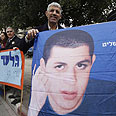
Israel to Egypt: Shalit's release part of any truce
Security sources say PM's recent statements on change Israel's list of priorities in ceasefire negotiations, may draw out talks, but add Hamas under internal pressure to come to agreement
Recent statements by Prime Minister Ehud Olmert, in which he claimed kidnapped soldier Gilad Shalit was Israel's first priority in any ceasefire agreement, raised hopes that the soldier may be released soon. Instead, it may just mean a ceasefire will take longer to negotiate.
Security sources told Ynet on Sunday that Hamas statements that negotiations on a ceasefire agreement were close to completion were baseless. "Egypt's test… will be to return Gilad Shalit before the current government's tenure comes to an end," they said.
Olmert's statements that "no crossings will be opened until Gilad Shalit is returned" have effectively changed Israel's entire list of priorities regarding the ceasefire agreement.
The prime minister's decision, which he reiterated on Sunday during a small forum with Foreign Minister Tzipi Livni and Defense Minister Ehud Barak, was intended to put pressure on Hamas – via Egypt – to take advantage of a narrow window of opportunity for a prisoner exchange.
The decision is partially derived from security estimates that Hamas is under immense pressure to do all it takes to lift the Israeli blockade of Gaza and secure the return of Palestinian prisoners, in order to renew its standing in the region.
For Olmert's part, such pressure by Israel appears to be the act of a government in its last days in office, freed from the restraints of day-to-day leadership and also supported in its efforts on Shalit by vast public opinion, despite the heavy price that the soldier's release will require.
As things stand, Israel would be required to release some 1,200 to 1,400 Palestinian prisoners, including hundreds of arch-terrorists.
Shalit family: Cautious, but optimistic
Meanwhile, the Campaign for the Release of Gilad Shalit expressed extremely cautious optimism.
The campaign's chairman, Hezi Mashita, told Ynet that "Noam and Aviva (Shalit, Gilad's parents) have had their fill of such statements, but they have a feeling that something is different this time and that there is an element of truth to the statements. Nonetheless, they are, of course, wary."
He emphasized the importance of expediting a deal, adding that if a deal is not closed prior to a change in Israeli government, "it will seal Gilad's fate."
Meshita, who was appointed chairman of the campaign by the family a few months ago, said that prior to last Tuesday's election, "we were told in no uncertain terms that the intention was to resolve the issue during the current government's tenure."
"I definitely get the impression that the other side has also been impacted by the recent elections and understands that it can close a deal soon. This is an opportunity that may not repeat itself," he added.
Meshita said that neither he nor the family have any additional information on Shalit's condition or the status of negotiations that has not been publicized in Israel media.
Ahiya Raved contributed to this report










